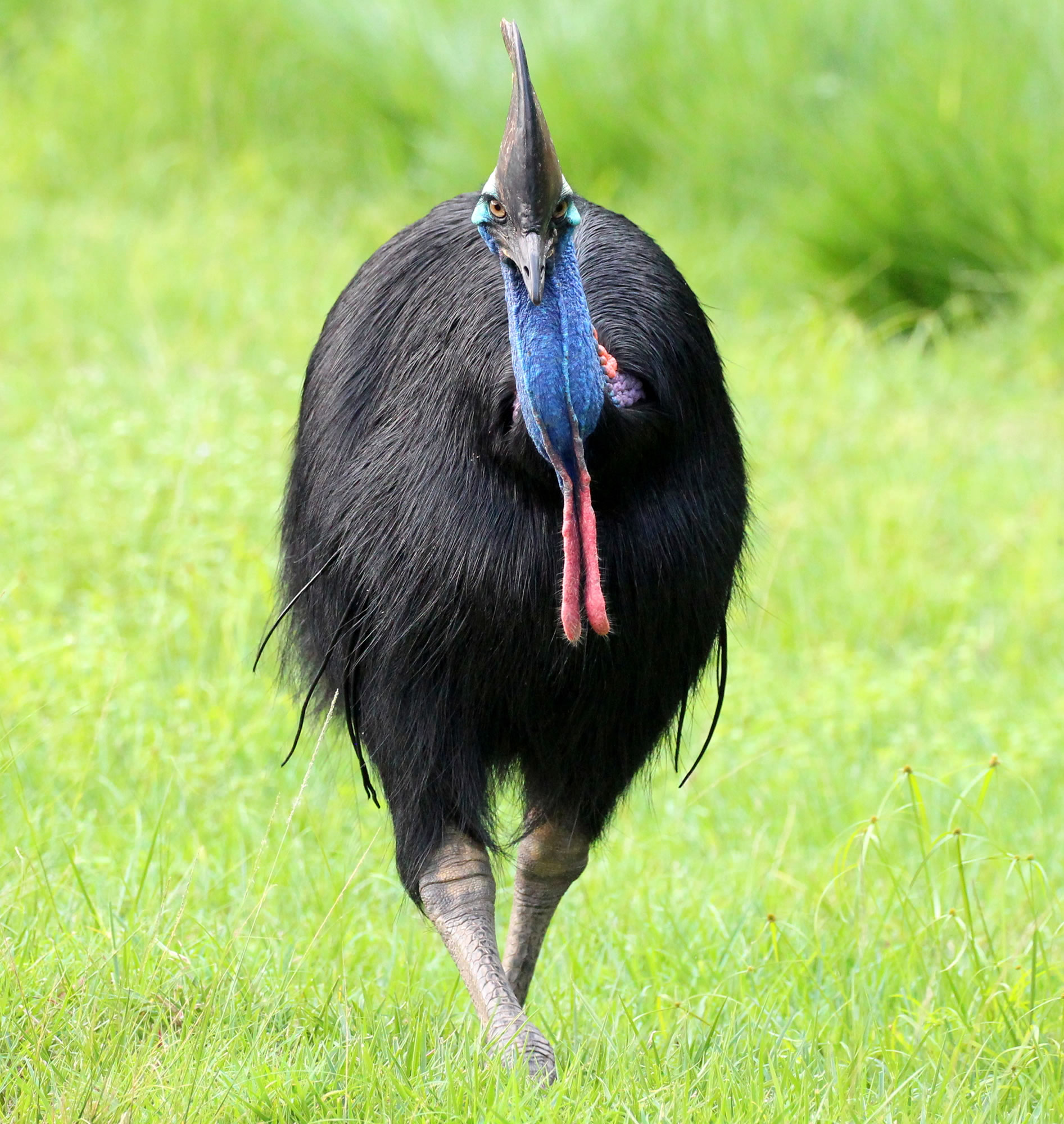Cassowary
With its brilliant blue and purple head and neck, red wattles, amber eyes and long lashes, the southern cassowary (Casuarius casuarius johnsonii) can only be found in the lush rainforest of the Wet Tropics World Heritage Area.
Believed to have walked the earth for more than 30,000 years, the ‘dinosaur bird’ is in danger of disappearing.
QTFN is on a mission to save this fascinating bird before it’s too late, joining forces with passionate conservation groups and volunteers to reclaim, restore and protect cassowary habitat.
Make your impact
- Strategically acquire properties to facilitate the expansion of the cassowary corridor in the Wet Tropics – ensuring the long-term survival of the endangered southern cassowary by saving critical habitat from development.
- Champion the permanent protection of these ecologically significant properties as nature refuges.
- Collaborate with Traditional Owners, partners and community volunteers to undertake rainforest restoration projects and provide more food sources, movement corridors and breeding grounds for the cassowary.
Want to explore more – watch the Cassowary Conservation Documentary

- The southern cassowary is listed in the top 20 threatened species in Australia.
- With as few as 4,000 southern cassowary estimated to remain in the wild, the Wet Tropics World Heritage Area is a stronghold for its conservation.
- Through our Revolving Fund, we have purchased and protected more than 700 hectares of cassowary habitat in the Wet Tropics Heritage Area since 2004, including Gurrbum Reserve, Cassowary Connection Nature Refuge, Daintree Lot 83 and Ant Plant East and Ant Plant West Nature Refuges.
- Over 6,620 native trees have been planted on Gurrbum Reserve with more to come, including cassowary food sources such as bandicoot berry (Leea indica), cassowary plum (Cerbera floribunda), and quandong (Elaeocarpus johnsonii).
- The vegetation on Cassowary Connection Nature Refuge is part of the largest contiguous block of lowland rainforest south of the Daintree River.
- We’re contributing to the expansion and acceleration of Daintree reforestation efforts through the provision of land on Daintree Lot 83 for a nursery where rainforest seedlings will be propagated.
“The cassowary disperses at least 60-70 species of rainforest trees … If the cassowary is surviving, the rainforest is surviving and all the other animals, plants and organisms that make up this incredible celebration of life on earth are able to survive.”
Peter Trott, Secretary, C4

Action & Insight
Feb 1Planting for impact
In partnership with C4 and fellow Cassowary Coast conservation group, Brettacorp Inc., QTFN has piloted the use of the Miyawaki planting method on two plots on its Gurrbum Reserve to accelerate rainforest reforestation on the property. A globally recognised planting method, Miyawaki is proven to create fast growing, high density, high biodiversity and high carbon […]
Feb 1Cassowary habitat revegetation
Thanks to the Queensland Department of Environment and Science, for funding our project to restore a critical link in Cassowary habitat within the Smith’s Gap Corridor, in Queensland’s Wet Tropics Region. This generous grant will allow us to plant 16,000 trees, over 4 hectares and weed a further 10.5 hectares at Gurrbum Reserve, a property […]
Feb 1Joining forces to build cassowary connections
QTFN has joined forces again with (C4) Community for Coastal and Cassowary Conservation organisation to secure more habitat for cassowaries. We were pleased to acquire part of a significant wildlife corridor at Smiths Gap, north of Tully. Over 10,000 trees will now be planted to provide safe avenues for cassowary movement, in partnership with C4 […]
Our work
- Strategically acquire properties to facilitate the expansion of the cassowary corridor in the Wet Tropics – ensuring the long-term survival of the endangered southern cassowary by saving critical habitat from development.
- Champion the permanent protection of these ecologically significant properties as nature refuges.
- Collaborate with Traditional Owners, partners and community volunteers to undertake rainforest restoration projects and provide more food sources, movement corridors and breeding grounds for the cassowary.
Want to explore more – watch the Cassowary Conservation Documentary

Our impact
- The southern cassowary is listed in the top 20 threatened species in Australia.
- With as few as 4,000 southern cassowary estimated to remain in the wild, the Wet Tropics World Heritage Area is a stronghold for its conservation.
- Through our Revolving Fund, we have purchased and protected more than 700 hectares of cassowary habitat in the Wet Tropics Heritage Area since 2004, including Gurrbum Reserve, Cassowary Connection Nature Refuge, Daintree Lot 83 and Ant Plant East and Ant Plant West Nature Refuges.
- Over 6,620 native trees have been planted on Gurrbum Reserve with more to come, including cassowary food sources such as bandicoot berry (Leea indica), cassowary plum (Cerbera floribunda), and quandong (Elaeocarpus johnsonii).
- The vegetation on Cassowary Connection Nature Refuge is part of the largest contiguous block of lowland rainforest south of the Daintree River.
- We’re contributing to the expansion and acceleration of Daintree reforestation efforts through the provision of land on Daintree Lot 83 for a nursery where rainforest seedlings will be propagated.
“The cassowary disperses at least 60-70 species of rainforest trees … If the cassowary is surviving, the rainforest is surviving and all the other animals, plants and organisms that make up this incredible celebration of life on earth are able to survive.”
Peter Trott, Secretary, C4

Action & insight
Action & Insight
Planting for impact
In partnership with C4 and fellow Cassowary Coast conservation group, Brettacorp Inc., QTFN has piloted the use of the Miyawaki planting method on two plots on its Gurrbum Reserve to accelerate rainforest reforestation on the property. A globally recognised planting method, Miyawaki is proven to create fast growing, high density, high biodiversity and high carbon […]
Cassowary habitat revegetation
Thanks to the Queensland Department of Environment and Science, for funding our project to restore a critical link in Cassowary habitat within the Smith’s Gap Corridor, in Queensland’s Wet Tropics Region. This generous grant will allow us to plant 16,000 trees, over 4 hectares and weed a further 10.5 hectares at Gurrbum Reserve, a property […]
Joining forces to build cassowary connections
QTFN has joined forces again with (C4) Community for Coastal and Cassowary Conservation organisation to secure more habitat for cassowaries. We were pleased to acquire part of a significant wildlife corridor at Smiths Gap, north of Tully. Over 10,000 trees will now be planted to provide safe avenues for cassowary movement, in partnership with C4 […]

